CHEMICAL IDENTIFICATION
-
RTECS NUMBER :
-
KN0875000
-
CHEMICAL NAME :
-
Ether, bis(2-chloroethyl)
-
CAS REGISTRY NUMBER :
-
111-44-4
-
BEILSTEIN REFERENCE NO. :
-
0605317
-
LAST UPDATED :
-
199712
-
DATA ITEMS CITED :
-
57
-
MOLECULAR FORMULA :
-
C4-H8-Cl2-O
-
MOLECULAR WEIGHT :
-
143.02
-
WISWESSER LINE NOTATION :
-
G2O2G
HEALTH HAZARD DATA
ACUTE TOXICITY DATA
-
TYPE OF TEST :
-
Open irritation test
-
ROUTE OF EXPOSURE :
-
Administration onto the skin
-
SPECIES OBSERVED :
-
Rodent - rabbit
-
TYPE OF TEST :
-
Open irritation test
-
ROUTE OF EXPOSURE :
-
Administration onto the skin
-
SPECIES OBSERVED :
-
Rodent - rabbit
-
TYPE OF TEST :
-
Standard Draize test
-
ROUTE OF EXPOSURE :
-
Administration into the eye
-
SPECIES OBSERVED :
-
Rodent - rabbit
-
TYPE OF TEST :
-
LD50 - Lethal dose, 50 percent kill
-
ROUTE OF EXPOSURE :
-
Oral
-
SPECIES OBSERVED :
-
Rodent - rat
-
DOSE/DURATION :
-
75 mg/kg
-
TOXIC EFFECTS :
-
Details of toxic effects not reported other than lethal dose value
-
TYPE OF TEST :
-
LC50 - Lethal concentration, 50 percent kill
-
ROUTE OF EXPOSURE :
-
Inhalation
-
SPECIES OBSERVED :
-
Rodent - rat
-
DOSE/DURATION :
-
330 mg/m3/4H
-
TOXIC EFFECTS :
-
Details of toxic effects not reported other than lethal dose value
-
TYPE OF TEST :
-
LD50 - Lethal dose, 50 percent kill
-
ROUTE OF EXPOSURE :
-
Oral
-
SPECIES OBSERVED :
-
Rodent - mouse
-
DOSE/DURATION :
-
209 mg/kg
-
TOXIC EFFECTS :
-
Sense Organs and Special Senses (Eye) - ptosis Gastrointestinal - changes in structure or function of salivary glands Gastrointestinal - hypermotility, diarrhea
-
TYPE OF TEST :
-
LC50 - Lethal concentration, 50 percent kill
-
ROUTE OF EXPOSURE :
-
Inhalation
-
SPECIES OBSERVED :
-
Rodent - mouse
-
DOSE/DURATION :
-
650 mg/m3/2H
-
TOXIC EFFECTS :
-
Details of toxic effects not reported other than lethal dose value
-
TYPE OF TEST :
-
LD50 - Lethal dose, 50 percent kill
-
ROUTE OF EXPOSURE :
-
Oral
-
SPECIES OBSERVED :
-
Rodent - rabbit
-
DOSE/DURATION :
-
126 mg/kg
-
TOXIC EFFECTS :
-
Details of toxic effects not reported other than lethal dose value
-
TYPE OF TEST :
-
LD50 - Lethal dose, 50 percent kill
-
ROUTE OF EXPOSURE :
-
Administration onto the skin
-
SPECIES OBSERVED :
-
Rodent - rabbit
-
DOSE/DURATION :
-
90 mg/kg
-
TOXIC EFFECTS :
-
Details of toxic effects not reported other than lethal dose value
-
TYPE OF TEST :
-
LC50 - Lethal concentration, 50 percent kill
-
ROUTE OF EXPOSURE :
-
Inhalation
-
SPECIES OBSERVED :
-
Rodent - guinea pig
-
DOSE/DURATION :
-
500 ppm/1H
-
TOXIC EFFECTS :
-
Details of toxic effects not reported other than lethal dose value
-
TYPE OF TEST :
-
LD50 - Lethal dose, 50 percent kill
-
ROUTE OF EXPOSURE :
-
Administration onto the skin
-
SPECIES OBSERVED :
-
Rodent - guinea pig
-
DOSE/DURATION :
-
300 mg/kg
-
TOXIC EFFECTS :
-
Details of toxic effects not reported other than lethal dose value
-
TYPE OF TEST :
-
LD50 - Lethal dose, 50 percent kill
-
ROUTE OF EXPOSURE :
-
Oral
-
SPECIES OBSERVED :
-
Mammal - species unspecified
-
DOSE/DURATION :
-
112 mg/kg
-
TOXIC EFFECTS :
-
Details of toxic effects not reported other than lethal dose value
-
TYPE OF TEST :
-
TDLo - Lowest published toxic dose
-
ROUTE OF EXPOSURE :
-
Oral
-
SPECIES OBSERVED :
-
Rodent - mouse
-
DOSE/DURATION :
-
33 gm/kg/79W-C
-
TOXIC EFFECTS :
-
Tumorigenic - Carcinogenic by RTECS criteria Liver - tumors Blood - lymphoma, including Hodgkin's disease
-
TYPE OF TEST :
-
TDLo - Lowest published toxic dose
-
ROUTE OF EXPOSURE :
-
Subcutaneous
-
SPECIES OBSERVED :
-
Rodent - mouse
-
DOSE/DURATION :
-
2400 mg/kg/60W-I
-
TOXIC EFFECTS :
-
Tumorigenic - equivocal tumorigenic agent by RTECS criteria Tumorigenic - tumors at site of application
MUTATION DATA
-
TEST SYSTEM :
-
Insect - Drosophila melanogaster
-
REFERENCE :
-
EMMUEG Environmental and Molecular Mutagenesis. (Alan R. Liss, Inc., 41 E. 11th St., New York, NY 10003) V.10- 1987- Volume(issue)/page/year: 23,51,1994 *** REVIEWS *** ACGIH TLV-Not classifiable as a human carcinogen DTLVS* The Threshold Limit Values (TLVs) and Biological Exposure Indices (BEIs) booklet issues by American Conference of Governmental Industrial Hygienists (ACGIH), Cincinnati, OH, 1996 Volume(issue)/page/year: TLV/BEI,1997 ACGIH TLV-STEL 58 mg/m3 (10 ppm) (skin) DTLVS* The Threshold Limit Values (TLVs) and Biological Exposure Indices (BEIs) booklet issues by American Conference of Governmental Industrial Hygienists (ACGIH), Cincinnati, OH, 1996 Volume(issue)/page/year: TLV/BEI,1997 ACGIH TLV-TWA 29 mg/m3 (5 ppm) DTLVS* The Threshold Limit Values (TLVs) and Biological Exposure Indices (BEIs) booklet issues by American Conference of Governmental Industrial Hygienists (ACGIH), Cincinnati, OH, 1996 Volume(issue)/page/year: TLV/BEI,1997 IARC Cancer Review:Animal Limited Evidence IMEMDT IARC Monographs on the Evaluation of Carcinogenic Risk of Chemicals to Man. (WHO Publications Centre USA, 49 Sheridan Ave., Albany, NY 12210) V.1- 1972- Volume(issue)/page/year: 9,117,1975 IARC Cancer Review:Human No Adequate Data IMEMDT IARC Monographs on the Evaluation of Carcinogenic Risk of Chemicals to Man. (WHO Publications Centre USA, 49 Sheridan Ave., Albany, NY 12210) V.1- 1972- Volume(issue)/page/year: 9,117,1975 IARC Cancer Review:Group 3 IMSUDL IARC Monographs, Supplement. (WHO Publications Centre USA, 49 Sheridan Ave., Albany, NY 12210) No.1- 1979- Volume(issue)/page/year: 7,56,1987 TOXICOLOGY REVIEW 85CVA2 "Oncology 1970, Proceedings of the Tenth International Cancer Congress," Chicago, Year Book Medical Pub., 1971 Volume(issue)/page/year: 5,250,1970 TOXICOLOGY REVIEW BNYMAM Bulletin of the New York Academy of Medicine. (New York Academy of Medicine, 2 E. 103rd St., New York, NY 10029) Ser 2: V.1- 1925- Volume(issue)/page/year: 54,413,1978 *** U.S. STANDARDS AND REGULATIONS *** MSHA STANDARD-air:TWA 5 ppm (30 mg/m3) (skin) DTLWS* "Documentation of the Threshold Limit Values for Substances in Workroom Air," Supplements. For publisher information, see 85INA8. Volume(issue)/page/year: 3,16,1973 OSHA PEL (Gen Indu):CL 15 ppm (90 mg/m3) (skin) CFRGBR Code of Federal Regulations. (U.S. Government Printing Office, Supt. of Documents, Washington, DC 20402) Volume(issue)/page/year: 29,1910.1000,1994 OSHA PEL (Construc):CL 15 ppm (90 mg/m3) (skin) CFRGBR Code of Federal Regulations. (U.S. Government Printing Office, Supt. of Documents, Washington, DC 20402) Volume(issue)/page/year: 29,1926.55,1994 OSHA PEL (Shipyard):CL 15 ppm (90 mg/m3) (skin) CFRGBR Code of Federal Regulations. (U.S. Government Printing Office, Supt. of Documents, Washington, DC 20402) Volume(issue)/page/year: 29,1915.1000,1993 OSHA PEL (Fed Cont):CL 15 ppm (90 mg/m3) (skin) CFRGBR Code of Federal Regulations. (U.S. Government Printing Office, Supt. of Documents, Washington, DC 20402) Volume(issue)/page/year: 41,50-204.50,1994 *** OCCUPATIONAL EXPOSURE LIMITS *** OEL-AUSTRALIA:TWA 5 ppm (30 mg/m3);STEL 10 ppm (60 mg/m3);Skin JAN 1993 OEL-AUSTRIA:TWA 10 ppm (60 mg/m3);Skin JAN 1993 OEL-BELGIUM:TWA 5 ppm (29 mg/m3);STEL 10 ppm (58 mg/m3);Skin JAN 1993 OEL-DENMARK:TWA 5 ppm (30 mg/m3);Skin JAN 1993 OEL-FINLAND:TWA 5 ppm (30 mg/m3);STEL 10 ppm (60 mg/m3);Skin JAN 1993 OEL-FRANCE:TWA 5 ppm (30 mg/m3);Skin JAN 1993 OEL-GERMANY:TWA 10 ppm (60 mg/m3);Skin JAN 1993 OEL-JAPAN:TWA 15 ppm (88 mg/m3);Skin JAN 1993 OEL-THE NETHERLANDS:TWA 5 ppm (30 mg/m3);Skin JAN 1993 OEL-THE PHILIPPINES:TWA 15 ppm (90 mg/m3);Skin JAN 1993 OEL-POLAND:TWA 10 mg/m3 JAN 1993 OEL-RUSSIA:STEL 0.6 mg/m3;Skin JAN 1993 OEL-RUSSIA:TWA 15 ppm;STEL 2 mg/m3;Skin JAN 1993 OEL-SWEDEN;Carcinogen JAN 1993 OEL-SWITZERLAND:TWA 5 ppm (30 mg/m3);STEL 25 ppm (50 mg/m3);Skin JAN 1993 OEL-THAILAND:TWA 15 ppm (90 mg/m3) JAN 1993 OEL-TURKEY:TWA 15 ppm (90 mg/m3);Skin JAN 1993 OEL IN BULGARIA, COLOMBIA, JORDAN, KOREA check ACGIH TLV OEL IN NEW ZEALAND, SINGAPORE, VIETNAM check ACGIH TLV *** NIOSH STANDARDS DEVELOPMENT AND SURVEILLANCE DATA *** NIOSH RECOMMENDED EXPOSURE LEVEL (REL) : NIOSH REL TO DICHLOROETHYLETHER-air:CA TWA 5 ppm (Sk);STEL 10 ppm REFERENCE : NIOSH* National Institute for Occupational Safety and Health, U.S. Dept. of Health, Education, and Welfare, Reports and Memoranda. Volume(issue)/page/year: DHHS #92-100,1992 NIOSH OCCUPATIONAL EXPOSURE SURVEY DATA : NOHS - National Occupational Hazard Survey (1974) NOHS Hazard Code - 84164 No. of Facilities: 21 (estimated) No. of Industries: 1 No. of Occupations: 2 No. of Employees: 41 (estimated)
|
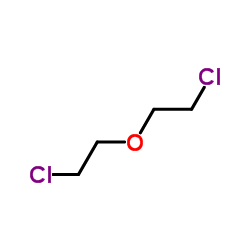
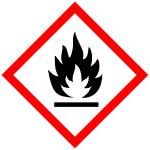
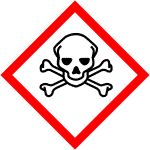
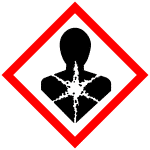



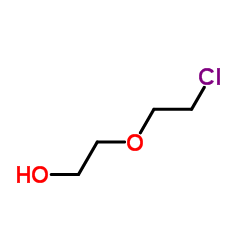 CAS#:628-89-7
CAS#:628-89-7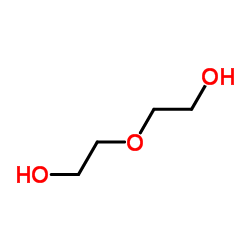 CAS#:111-46-6
CAS#:111-46-6 CAS#:106-75-2
CAS#:106-75-2 CAS#:107-07-3
CAS#:107-07-3 CAS#:54509-73-8
CAS#:54509-73-8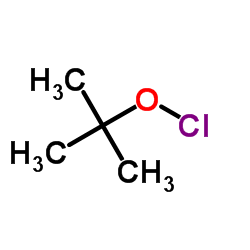 CAS#:507-40-4
CAS#:507-40-4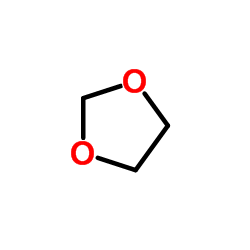 CAS#:646-06-0
CAS#:646-06-0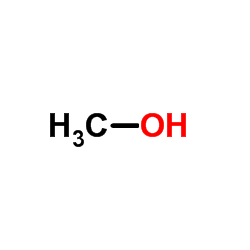 CAS#:67-56-1
CAS#:67-56-1 CAS#:10288-17-2
CAS#:10288-17-2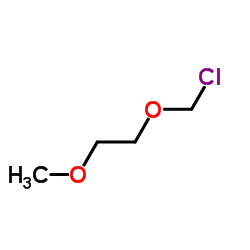 CAS#:3970-21-6
CAS#:3970-21-6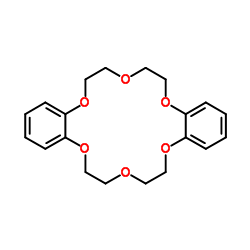 CAS#:14187-32-7
CAS#:14187-32-7![1,2-bis[2-(2-chloroethoxy)ethoxy]benzene structure](https://www.chemsrc.com/caspic/258/41758-00-3.png) CAS#:41758-00-3
CAS#:41758-00-3![2-[2-(2-chloroethoxy)ethoxy]phenol structure](https://www.chemsrc.com/caspic/481/111875-63-9.png) CAS#:111875-63-9
CAS#:111875-63-9 CAS#:109-93-3
CAS#:109-93-3 CAS#:109-02-4
CAS#:109-02-4 CAS#:123-91-1
CAS#:123-91-1 CAS#:110-75-8
CAS#:110-75-8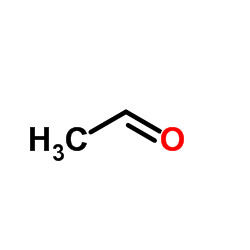 CAS#:75-07-0
CAS#:75-07-0 CAS#:34270-90-1
CAS#:34270-90-1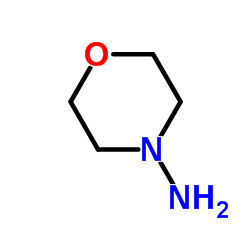 CAS#:4319-49-7
CAS#:4319-49-7
